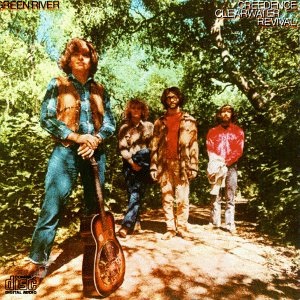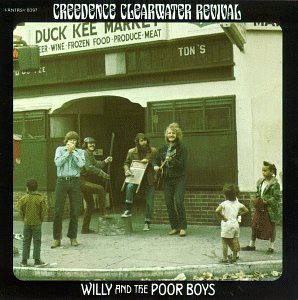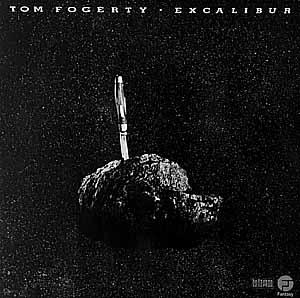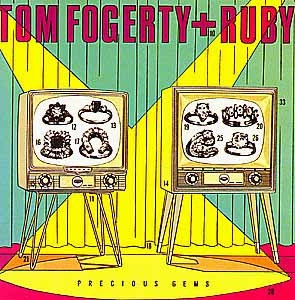Related Research Articles

Creedence Clearwater Revival, commonly abbreviated as CCR, was an American rock band formed in El Cerrito, California. The band initially consisted of lead vocalist, lead guitarist, and primary songwriter John Fogerty; his brother, rhythm guitarist Tom Fogerty; bassist Stu Cook; and drummer Doug Clifford. These members had played together since 1959, first as the Blue Velvets and later as the Golliwogs, before settling on Creedence Clearwater Revival in 1967. The band's most prolific and successful period between 1969 and 1971 produced fourteen consecutive top 10 singles and five consecutive top 10 albums in the United States – two of which, Green River (1969) and Cosmo's Factory (1970), reached number one. The band performed at the 1969 Woodstock festival in Upstate New York, and was the first major act signed to appear there.

John Cameron Fogerty is an American singer, songwriter and guitarist. Together with Doug Clifford, Stu Cook, and his brother Tom Fogerty, he founded the band Creedence Clearwater Revival (CCR), for which he was the lead singer, lead guitarist, and principal songwriter. CCR had nine top-10 singles and eight gold albums between 1968 and 1972, and was inducted into the Rock and Roll Hall of Fame in 1993.

John Barry Prendergast was a British composer and conductor of film music.

Cosmo's Factory is the fifth studio album by American rock band Creedence Clearwater Revival, released by Fantasy Records in July 1970. Six of the album's eleven tracks were released as singles in 1970, and all of them charted in the top 5 of the Billboard Hot 100. The album spent nine consecutive weeks in the number one position on the Billboard 200 chart and was certified 4x platinum by the RIAA in 1990.

Thomas Richard Fogerty was an American musician, best known as the rhythm guitarist for Creedence Clearwater Revival. He was posthumously inducted into the Rock and Roll Hall of Fame in 1993.

Green River is the third studio album by American rock band Creedence Clearwater Revival, released in August 1969. It was the second of three albums they released in that year, preceded by Bayou Country in January and followed by Willy and the Poor Boys in November.

Willy and the Poor Boys is the fourth studio album by American rock band Creedence Clearwater Revival, released by Fantasy Records in November 1969. It was the last of three studio albums the band released that year, arriving just three months after Green River.

Pendulum is the sixth studio album by American rock band Creedence Clearwater Revival, released by Fantasy Records on December 9, 1970. It was the second studio album the band released that year, arriving five months after Cosmo's Factory.

Mardi Gras is the seventh and final studio album by American rock band Creedence Clearwater Revival, released on April 11, 1972. Recorded after the departure of guitarist Tom Fogerty, it was the band's only studio album as a trio, and featured songs written, sung, and produced by each of the remaining members, rather than just John Fogerty. The recording sessions were marred by personal and creative tensions, and the group disbanded after a short U.S. tour to support the album.

Merl Saunders was an American multi-genre musician who played piano and keyboards, favoring the Hammond B-3 console organ.
Sidekick primarily refers to:

"Fortunate Son" is a song by the American rock band Creedence Clearwater Revival released on their fourth studio album, Willy and the Poor Boys in November 1969. It was previously released as a single, together with "Down on the Corner", in September 1969. It soon became an anti-war movement anthem and an expressive symbol of the counterculture's opposition to U.S. military involvement in the Vietnam War and solidarity with the soldiers fighting it. The song has been featured extensively in pop culture depictions of the Vietnam War and the anti-war movement.

Sidekicks is an album by Tom Fogerty and Randy Oda. The album was recorded in 1988 and released in 1992 on Fantasy Records, two years after Fogerty's death in 1990. Due to its posthumous release, Sidekicks stands as Fogerty's final album.

Excalibur is an album by American guitarist and singer Tom Fogerty. His second solo effort, it was released in 1972. The album features Jerry Garcia on guitar, Merl Saunders on keyboards, John Kahn on bass, and Bill Vitt on drums.

Ruby is the debut album by American rock group Ruby, featuring Tom Fogerty.

Rock & Roll Madness is the second album by American rock group Ruby, featuring Tom Fogerty.

Deal It Out is Tom Fogerty's fifth and final solo album, though he would release one album, Precious Gems, as "Tom Fogerty + Ruby" and record an album with Randy Oda, Sidekicks, that was released posthumously.

Precious Gems is a compilation album by the band Ruby, containing tracks from their two studio albums from 1977 and 1978.
Ruby was an American rock band that between 1976 and 1978 recorded two albums, Ruby and Rock & Roll Madness. In 1984, the compilation Precious Gems was released. In 1988, Randy Oda and Tom Fogerty made another album, Sidekicks, with Kevin Oda on drums, and Tom's son Jeff on bass; the album was not released until five years later, by which point Fogerty had died.
Bill Vitt was an American drummer and keyboardist. He worked extensively as a live performer and as a session musician. In the 1970s he played with Brewer & Shipley, Jerry Garcia, Merl Saunders, and the Sons of Champlin.
References
- ↑ "Tom Fogerty Invites You to Dance". The Berkeley Gazette. October 23, 1976. p. 20. Retrieved April 14, 2020.
- ↑ "Tom Fogerty Invites You to Dance". The Berkeley Gazette. October 23, 1976. p. 20. Retrieved April 14, 2020.
- ↑ "Oda Likes Its Records Loud". March 17, 1973. p. 24. Retrieved January 13, 2020.
- ↑ "Oda (4)". Discogs. Retrieved April 20, 2020.
- ↑ "Keystone Date". August 29, 1980. p. 19. Retrieved January 13, 2020.
- ↑ "Oda Joy of It". The Berkeley Gazette. January 14, 1983. p. 19. Retrieved January 13, 2020.
- ↑ "Rocker Randy Oda plays at Keystone Wednesday". The Berkeley Gazette. December 25, 1981. p. 48. Retrieved February 5, 2020.
- ↑ "Oda headlines Keystone Friday". The Berkeley Gazette. February 3, 1983. p. 14. Retrieved February 5, 2020.
- ↑ "Chris Treadway: World Series trophies, Playland reading benefit and garage band reunion". East Bay Times. January 21, 2015. Retrieved January 12, 2020.
- ↑ "Ruby Is a Futuristic Gem of Electric Rock". The San Francisco Examiner. January 9, 1976. p. 25. Retrieved January 13, 2020.
- ↑ "Ruby Pleasant Surprise for Civic". Santa Cruz Sentinel. April 2, 1978. p. 17. Retrieved January 13, 2020.
- ↑ "BBC Schools Music Bart By Ruby On Pages From Ceefax 18th November 2005". viralhub.video. Retrieved April 20, 2020.
- ↑ Ruby - Ruby | Songs, Reviews, Credits | AllMusic , retrieved April 20, 2020
- ↑ Rock'n'Roll Madness - Ruby | Songs, Reviews, Credits | AllMusic , retrieved April 20, 2020
- 1 2 "Rockin' island style". Rapid City Journal. June 18, 2015. p. 32. Retrieved February 5, 2020.
- ↑ Sidekicks - Tom Fogerty | Credits | AllMusic , retrieved April 20, 2020
- ↑ Whitburn, Joel (2004). The Billboard Book of Top 40 Hits, 8th Edition (Billboard Publications), page 433.
- ↑ No Control - Eddie Money | Songs, Reviews, Credits | AllMusic , retrieved April 20, 2020
- ↑ "Arnold Schwarzenegger's Total Body Workout - Arnold Schwarzenegger | Songs, Reviews, Credits". AllMusic. Retrieved April 14, 2020.
- ↑ "Randy Oda | Credits". AllMusic. Retrieved April 14, 2020.
- ↑ "Getaway - 'Opo | Songs, Reviews, Credits". AllMusic. Retrieved April 14, 2020.
- ↑ "Getaway - 'Opo Releases". AllMusic. Retrieved April 14, 2020.